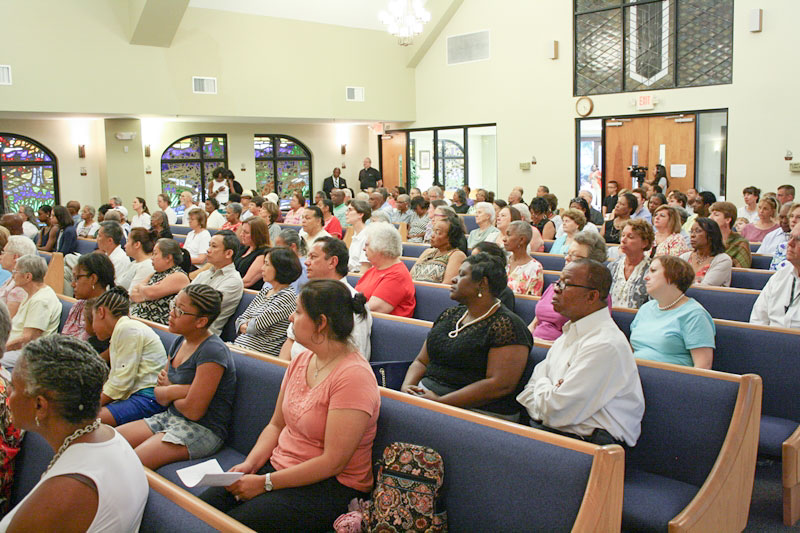
These days any event that brings people together without risking a flurry of COVID-19 diagnoses is most welcome. Interfaith Harmony Month, celebrated in January in South Carolina, was one such event. Now, in February, Black History Month has similarly offered creative spaces for people to meet, learn, and reflect.
The Interfaith Partners of South Carolina, based in Columbia, publicized virtual tours of places of worship, lectures and dialogues throughout January. These opened windows into the beliefs and practices of Christian, Jewish, Muslim and Eastern religionists, and those who adhere to indigenous and pagan nature traditions. Similar events in 2020 were live. This year the quality was high, but reliant on Zoom.
The Interfaith Partners of Aiken hosted a “living library” on January 30. Representatives from various faith traditions had 25 minutes to serve as the living “book” about their religious faith. That Saturday found me comparing and contrasting Catholicism with Baha’i, Unitarian-Universalist, and Zen Buddhist traditions. The Baha’i and I compared notes about humanitarian gatherings held pre-pandemic at the Baha’i Center in Columbia. The Unitarian-Universalist and I conversed about Ralph Waldo Emerson. The Zen Buddhist, Ha Nguyen, and I discussed Thomas Merton, the Trappist monk and lauded Catholic spiritual writer (d. 1968) who actively engaged with Zen monks after the Second Vatican Council. We also joked about how the name Nguyen is as common a family name as Smith in Vietnam.
At the end of the Aiken event, Bill Collins, a parishioner at St. Mary Help of Christians, talked about the support he has received for decades from his pastors, who have consistently encouraged his involvement in interfaith understanding and cooperative action on behalf of the civic community.
A continuing event is one sponsored by the College of Charleston in cooperation with the Charleston Interfaith Council. The Tuesday night series focuses on African American religion in South Carolina. Judge Arthur McFarland, a parishioner at St. Patrick’s, recently described how the Black Catholic presence dates back to pre-Revolutionary War Catholics who were seized in the Congo, brought to the colonies to be slaves, and participated in the Stono Rebellion in search of freedom — including yearned-for religious freedom.
Judge McFarland also cited the lasting influence of the Oblate Sisters of Providence, an African American community of sisters who staffed schools in South Carolina for decades. Their founder, Mother Mary Lange, is among six African Americans now on the road to canonization.
Kathleen Merritt, director of our diocesan Ethnic Ministries Office, has initiated a series of participant-friendly First Friday Coffee and Conversation gatherings. This month, Judge McFarland recounted history and urged action on behalf of promoting priestly, diaconal, and religious vocations among African American Catholic youth. He remarked that the prominence of African priests now pastoring our parishes has brought us full circle.
Delores Gilliard, principal at St. Martin de Porres School, followed the judge’s remarks and spoke about the importance of activities that highlight the importance of African American history and African American heroes — not just for one month of the year but across the curriculum throughout the year.
In addition to these, Bluffton and Hilton Head on Feb. 3 held a live celebration at the new Veteran’s Plaza to honor the Four Chaplains — the priest, rabbi, and two ministers who surrendered their life jackets to allow several young men to survive when the USS Dorchester was torpedoed during World War II. The American Legion hosted, and Rabbi Brad Bloom, BethYam Synagogue; Rev. Dr. Jonathan Black, Campbell Chapel A.M.E.; Rev. Christine Herrin, Lowcountry Presbyterian; and Deacon John Crapanzano, St. Gregory the Great, all shared reflections honoring the brotherhood of these faith leaders. Each speaker noted how the chaplains prayed together and sang, with arms linked, as the ship went down.
Meanwhile, St. Gregory was opening its new soup kitchen that same day, a service championed by the local Knights of Columbus and designed to help feed a multi-racial, multi-religious community of people in need.
All of these events embody the spirit of mutual understanding and care which Pope Francis has pointedly advocated in his latest encyclical, “Fratelli Tutti.” Reflection, fellowship, and positive action promise somehow that we will build God’s Kingdom with respect and reverence.

